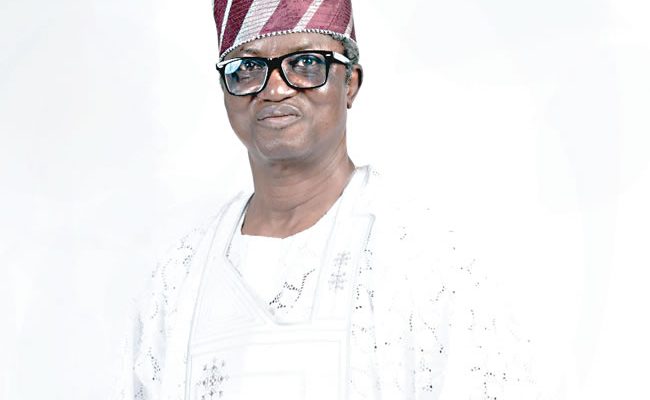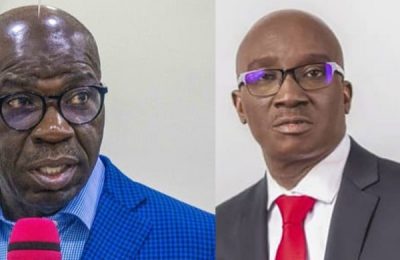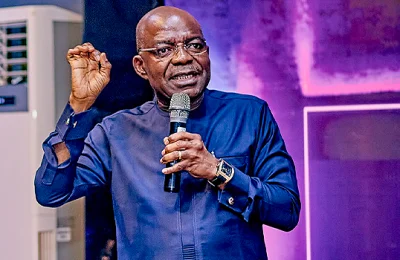Honourable Adesola Samuel Adedayo is the member representing Apapa Federal Constituency in the House of Representatives. The federal lawmaker is also a medical doctor, two-term chairman of Apapa-Iganmu LCDA and member of University of Ilorin Governing Council for five years. He told BOLA BADMUS the story of his life as he turned 70.
WHAT are the memories of the last 70 years?
Well, there are certain periods that I remember very vividly with nostalgia; when I finished my primary school in 1966, at St. James Primary School, in Iludun Oro in Kwara State; when I finished my secondary school in 1971, in Esie/Iludun Grammar School also in Kwara State; then when I did my A-Level in Kwara State College of Technology as one of the pioneer students that did A-Level Cambridge; then when I entered the University of Ibadan in 1974 and graduated in 1979, and when I served in the old Sokoto State, when Sokoto, Zamfara and Kebbi were one state. I started my internship and I became the Secretary General of National Association of Resident Doctors (NARD) in Ilorin, before the Buhari/Idiagbon regime kicked me out. When I started private practice, when I became council chairman, when my son died and when I became a member of the House of Representatives. These were some of the occasions, and of course, when I got married on December 17, 1983. Those were memorable times. God has been very great.

Would you say your life turned out as planned?
Not really, it’s just a matter of chance. I am a zonal pastor in the Redeemed Christian Church of God (RCCG) and I believe that we have been destined and I have a lot of people who had helped me along the way; selecting what subjects to offer in school certificate, for example. No matter how brilliant you are, the Yoruba have a saying that ‘obe ko le gbe eku ara re.’

I love my teachers, they did a lot of good work on me in my primary, secondary and university days. I have utmost respect for my university lecturers and my medical school teachers because they taught me a lot and I would forever be grateful to them. My parents as well; I wouldn’t have been what I am without my them. They have a role which they have played successfully and they’ve been wonderful parents. They have done a lot.
How did you meet your wife, sir?
She is a sister to a friend of mine. She was in Mayflower School, Ikenne, Ogun State at that time under the Tai Solarin’s style of discipline as it is known and I saw her as a very gentle and very intelligent girl. I got attracted to her, and we eventually got married. Even before we got married, she wanted to study Medicine but I thought that being a doctor and my wife also a doctor, it won’t afford us the needed time to take care of our home. So she decided to study Pharmacy and graduated in 1983 from the University of Benin (UNIBEN). She is more intelligent than me, she is smarter but I am more courageous, emi laya.
Looking back now, are there things you could have done differently, regarding certain decisions you took and considering how relocating to Lagos obviously paid off?
It was not even my own decision. When Buhari-Idiagbon regime sacked me, I had a boss, Dr Mustapha from Offa, who loved me, and he recommended me to Dr Alabi in Kaduna, who had a very big hospital. I think he is somehow related to late Chief MKO Abiola. In Kaduna, he was a very popular doctor then but I never got to meet him. They offered me employment through a phone call, and when I was supposed to report in Kaduna, my mother started crying because her junior brother died in Kano; he never came back home. She said her brother (my uncle) worked all his life in Kano and never came back home, and I also wanted to go to Kaduna. I said it would not matter, but, by and large, I wanted to satisfy her. I asked her ‘where do you want me to go?’ and she said Lagos. That was how I came to Lagos and worked with Dr Afolabi who owned Foundation Hospital at that time. He is now of blessed memory but he was also a very good teacher and a very good person.
What happened thereafter?
After a while, I left Afolabi and joined my brother-in-law and we started our own joint venture which we called JimSam, Jim is James, Sam is Samuel; it was a joint venture. I later started a branch at Badiya, and that was how it worked out. I think it’s just providence and about being at the right place at the right time. All these things are things you can’t determine, they are things that had been ordained, whether you like it or not. You can’t predict certain things, you can’t see into the future.
What I should have done earlier is that I should have started politics earlier because serving at the grassroots is a very tough business. It prepares you, makes you tough, and helps you to be able to handle so many things in life, but it’s a very tough call to be at the grassroots.
Why the tough grassroots then?
I have been involved in politics since my university days. I wanted to be a welfare officer of Alexander Brown Hall, but didn’t succeed. When I was in Sokoto, we used to go and see then President (Shehu) Shagari whenever he came to his Shagari Village. As youth corps members, we would pay him courtesy visits and that made me more interested in politics.
Now, when the military wanted to leave power, some of us thought that they were not serious, so we weren’t too involved, but I supported and financed the progressives in my local government.
Then I felt that as a chairman of council, I could influence things in my locality more than just being an ordinary person because government can touch the lives of individuals more than a private person. That was my idea, that you could do better things for more people while in government rather than being an individual. So I thought I could just start with the grassroots.
I have been living in the community since 1988 and then I contested in 2008. So I have been in the community and I know everyone there in Apapa-Iganmu. I am a community leader both there and even in my state back home in Oro, Kwara State. I love to influence things, to assist people and I thought the best position to do that is to be in government; to reach out and be able to influence decisions. You know if you are not a council chairman and the governor calls the meeting of council chairmen, they wouldn’t allow you to enter no matter how rich you are. I wanted to be part of the decision-makers at the grassroots, I wasn’t exposed to the legislative area od governance then, I started out in the executive branch.
You are 70 years old now. Are there experiences in the past that got you close to costing you your life?
There were several of them, many of which we don’t even know or we don’t even take cognizance of. When we were younger, because we don’t have this fear of death, some of the experiences we had didn’t really make you shake, but we took too many risks.
There was a time one of my girlfriends was doing convocation at the University of Ife. We left Ajegunle for Lagos Island in the night to party. We now left that party at 2 am to go to Ife in those days. Six of us were in a Beetle car. When we got to Sagamu, a policeman stopped us and asked ‘these boys, where are you going?’ We said we were going to Ife for a convocation tomorrow morning. He wondered ‘in the early hours, around 2:30 am?’ He just took the car key from us and that was how we slept off. When we woke up around 6 am, he returned the key to us. That was the type of life we were living.
I also remember when we went to America as council chairmen and we had this turbulence in the air. I have never seen something close to that in my life. There were at least about 12 to 13 members of our class, class of 2013 and 2014 on that plane and the plane could have crashed; I have never seen a situation where the wings of the aircraft would almost meet in the middle. When we managed to land at a place that was not our destination, the whites among us said they were no longer going.
Did you also disembark?
No, they left by road, but we still went ahead in the aircraft. It was a very young Caucasian pilot who was confident and he told us nothing would happen. I didn’t believe it because I thought that was the end. That was one of the things I remember vividly.
I also remember while we were in the Medical School in Ibadan, the pre-clinical school is different from clinical school. Pre-clinical is at the University of Ibadan (UI) main campus, the clinical school is at the University College Hospital (UCH), which is a bit away from other students. But when there were crises, we would still go there. Every Adekunle Adepoju Day, we would go to the campus.
I remember the Ali-Must-Go crisis happened while I was in UCH, but I went to UI to partake in the crisis. When UI was shut, we came to Lagos and I was at the University of Lagos when they attacked us by sea, by land, by air during that time. God just said we were going to live and there were so many events like that, too many of them. You know one can forget, but when you are in crisis, you will remember missed-death experiences.
Looks like you were very social as a young man.
After I finished my A-Level, I taught for some time at Queens School, Ilorin. Queens School is different from Queens College, which is in Lagos. So I was teaching as an HSC graduate, waiting to go to the university. We taught female students. It was at that time they paid us Udoji. So they gave us a large amount of money and at that time I had a circle of jolly friends with whom I took beer and socialised very well because we had money.
Suddenly, we just said we were going to Lagos in the evening. We left in a car and had an accident around Ogbomoso. After we passed Ogbomosho, there was a bend and the accident broke the car we were in into two, but we managed to escape and still continued with the journey.
Were those close shaves limited to your younger years?
Not really. Recently, I had a nasty experience on my farm. I have a very big farm with a partner, about 260 hectares of farmland in Kwara. It’s more than 3 miles by 3 miles. So, I usually go to see how the farmland is doing. My wife comes around too, sometimes she might be there for one or two weeks. Usually, when I go in the morning, I won’t come back until 4 or 5 pm. I went there this day and I was coming back that evening, I just knocked my foot on this stump and fell, hitting my chest on the ground. I heard a disturbing sound in my chest as I fell and I felt I had injured my chest. I couldn’t stand. I was carried onto the vehicle. I called my daughter and she said ‘Daddy, just go to Ilorin and do one test or the other quickly.’ I did but thankfully, nothing serious was found. I felt very uncomfortable in the chest.
You have really survived situations…
Again, armed robbers came to our place when we were in Surulere in 1994 at the time my first son was about to go to the college. Our last born was about three years old then, so he didn’t know that they were armed robbers. They ransacked our house, fortunately, my wife stopped keeping earrings as soon as she became a member of the Redeemed Christian Church of God, but they made away with the cash they found at home because my wife was into import and export business. I believed the people had information because they asked specific questions: ‘Do you have dollars at home?’ ‘Are you comfortable?’ I told them I was doing well, because they definitely didn’t expect me to be poor. Then armed robbery incidence was very rampant at the time. You would just hear on the radio that they have attacked somebody at Bashir Augusto in Surulere. I was at Bashir Augusto at that time and we now moved to Bashir Shittu here, so it was from one Bashir to another Bashir.
So how do you relax?
The average life expectancy in Nigeria now is around 52, so I have lived an extra 18 years and should be grateful to God, but my habits are still my habits. I try to do a lot of exercise. Then I read a lot, I do a lot of bookwork. Even most of the time I would read and fall asleep and I think I enjoy that. Then I like to try to motivate other people to see that we need to work closely to reach others in spite of our differences. I also want people to believe that you should put yourself in others’ shoes to know how to influence or how to cooperate with them. If you put yourself in their shoes, you would be able to realise how to influence them. And then I try to do as much as I ask others to do because you have to convince them to do what you are asking them to do. You also must do it otherwise they will not believe you.
Going forward, are you going to change your lifestyle?
How do you mean?
You are 70 now, are there things you are going to start doing differently?
Yes, I am supposed to retire from the Redeemed Christian Church of God at the age of 70, but because my birthday comes after the convention, I have a grace of one extra year. They won’t retire me immediately. If my birthday had been before August, they would have written to me.
I have a project in the church I am pastoring now; we need to rebuild the church. I want to spend most of my time on it. We are at the final stages of approval and we have got a contractor because the place is waterlogged. We have to pile it and I have decided that whatever people are going to give me, should be monetised and sent to my church for the building project.
And once I retire from the church, I am going into non-denominational evangelism. I don’t want it to be attached to any church. I also want to continue with the pet project in my village. We have a diocese in my town; Iludun Oro. They called it Igbomina West Anglican Diocese. As part of remembrance for our late son, Dr. Adeyosola Adedayo, we built a medical facility in the village that would be commissioned during his 40th post-humous birthday this year.
Does it mean that your retirement from the church is also retirement from medical practice?
I don’t think I can retire from medical practice.
What about retirement from politics?
No, no.
You are going to be a politician for life?
You know that’s the only profession that touches the life of everybody.
More like political evangelism?
Whatever you call it, but I want people to be involved. Don’t just keep criticising, come with ideas. I have told people, it is not only the legislators that can bring bills; you also can bring private member bills if you know we are not doing the right thing. Liaise with somebody close to you, bring a bill, we will read it on the floor of the National Assembly and we will nurture it.
I have so many bills, but I don’t have enough money to even push them because it is not even cheap with those who re-write those bills to pass them. I consulted one professional and constitutional bill writer; he gave me a bill of N35 million which I could not afford. They are just four bills and these are bills that would affect the health of the people. Some of these things are so complex, but we must carry on.
People are agitated that maybe the military should come back. It’s only the people who were not alive when the military was in power that would push that narrative. The problem we are having in Nigeria now was partly caused by the military. And once they taste power, it is like a lion tasting blood. We have serious problem. I thank God for Asiwaju (President Bola Tinubu), but even if you are going to elect me, I don’t want to do what he is doing. I admire him but I don’t envy him at all. No matter what you do, people will read meanings into it.
READ ALSO: Insecurity: Deploy personnel to Edo communities, Reps urge IGP, DSS, others







